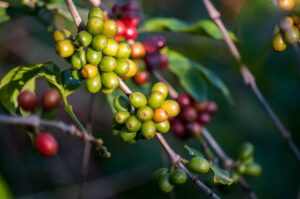Welcome to Coffees and Espresso
“Coffee: because adulting is hard.”
The Amazing History of Coffee
History of Coffee: Origins
The history of coffee is long and varied, spanning over centuries. It is believed that coffee was first discovered in the 9th century, in Ethiopia. Legend has it that coffee was discovered by an Ethiopian shepherd named Kaldi. According to the story, Kaldi noticed that his goats became more energized and lively after eating certain berries. He shared his discovery with a local monk, who gruffly dismissed it as the work of the devil.
Undeterred, Kaldi decided to try the berries himself, and found that they did indeed keep him awake for hours on end. He eventually brought some of the berries to a nearby city, where they quickly became a sensation. Today, coffee is enjoyed by people all over the world, and Kaldi’s story is remembered as one of the most enduring tales in coffee lore.
Thanks to Kaldi’s curiosity and willingness to experiment, we can all enjoy a cup of coffee and experience its unique flavor and aroma. The first documented evidence of coffee drinking dates back to the 16th century in Yemen, where it was mostly consumed by Sufis for its stimulant properties during religious ceremonies. However, it wasn’t until the 15th century that it began to spread to the Middle East and Europe.
The traditional way of brewing coffee in the Middle East is quite different from other parts of the world, as it uses an ibrik, a small pot with a long handle. The beans are roasted over hot coals and then ground with a mortar and pestle before being boiled with sugar in the ibrik. Often, spices like cardamom and cloves are added for flavor. The coffee is then poured into tiny cups to produce a thick foam on top. This style of making coffee has been passed down through generations and continues to be enjoyed in homes and cafes throughout the Middle East today.
History Of Coffee: Controversy
While coffee was gaining popularity throughout the world, not everyone was on board, particularly the Catholic Church. In 1624, Pope Clement VIII was asked to weigh in on the controversy surrounding coffee. At the time, many people believed that coffee was the work of the devil, and there was a strong movement to ban the drink. After tasting coffee for himself, Pope Clement declared that it was “so delicious that it would be a pity to let Satan have all the credit.” With that declaration, coffee became more widely accepted, and today it is enjoyed by people of all faiths.

History Of Coffee: King Louis becomes A Coffee Fan
King Louis XIV of France was a great admirer of coffee. He had heard about the beverage from his friend, an ambassador to Turkey, and wanted to sample it for himself. Since coffee had only been introduced in the Middle East at that time, he sent a delegation to bring back some beans and brewing equipment.
The French were quick to embrace the drink, and soon it had become a fashionable beverage in many royal courts throughout Europe. He introduced the drink to France, making it one of his favorite beverages and even hosting coffee tastings for his courtiers in Versailles. His reign saw the development of Paris’s first coffee houses, and he was so passionate about the drink that he even planted coffee trees in the royal gardens of Versailles.
Small amounts of coffee had been imported to New Amsterdam by the British, but coffee was fully introduced to the Americas by King Louis. His courtiers brought coffee beans with them when they traveled to the New World and began planting coffee trees in the Caribbean, Central America, and South American countries.
The impact that King Louis XIV had on North American coffee culture is undeniable. From introducing the plant to popularizing it throughout the continent, he was instrumental in shaping how people enjoy their coffee today.
History Of Coffee: Coffee Becomes The Favorite In North America
As the Revolution progressed, coffeehouses and taverns began popping up across the country, serving as places of socialization and discussion for patriots. Coffee soon became a staple beverage in American households, with supplies imported from farms in South America, Central America and the Caribbean. To this day, coffee remains an important part of American culture, with more than 500 million cups consumed in the United States every day.
History Of Coffee: The Popularity Continues
The United States has become one of the top coffee producing countries in the world and is home to many popular coffee brands. Furthermore, North America continues to be heavily influenced by its French heritage when it comes to coffee consumption, with certain cities having a particularly strong affinity for French-style espresso drinks.
The history of coffee is a long and fascinating one, and we have only scratched the surface.. From its first discovery in Ethiopia to becoming an integral part of many cultures’ lifestyles today, it’s clear that this beloved beverage has come a long way. With new innovations and variations on offer, there are now more ways than ever to enjoy a cup of coffee. Whether you’re looking for something classic or something unique, there’s always something for everyone. The best part? You can be sure that each cup will be as delightful and energizing as the last!
For more information visit https://www.ncausa.org/
It is
- Uncategorized
- Uncategorized
- Uncategorized
- Learning
- Uncategorized
